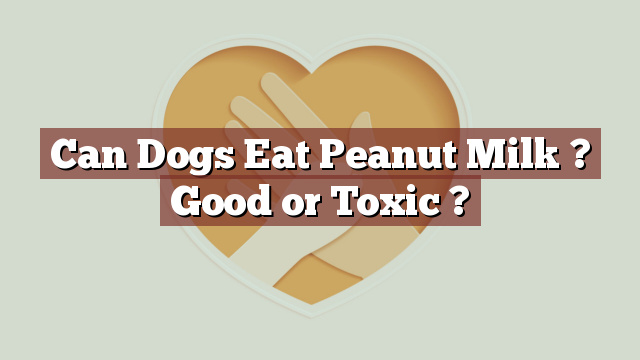Can Dogs Eat Peanut Milk? Considerations for Feeding Your Canine Companion
As pet owners, it is crucial to be aware of what foods are safe and suitable for our four-legged friends. Dogs have specific dietary needs, and it is essential to provide them with a balanced and nutritious diet. One common question that arises is whether dogs can consume peanut milk. In this article, we will explore the nutritional value of peanut milk, evaluate its safety for dogs, discuss potential risks and benefits, and provide guidance on what to do if your dog consumes peanut milk.
Nutritional Value of Peanut Milk: Is It a Suitable Food for Dogs?
Peanut milk, derived from blending peanuts with water, has gained popularity as a dairy-free alternative. This plant-based milk is known to be rich in several nutrients that are beneficial to humans. However, when it comes to dogs, the nutritional value of peanut milk needs to be carefully evaluated.
Peanuts are a good source of protein, healthy fats, and various vitamins and minerals such as vitamin E, niacin, and magnesium. These components can provide numerous health benefits to humans, but it is important to note that dogs have different nutritional requirements.
Safety of Peanut Milk for Dogs: Toxicity and Potential Harmful Effects
Can dogs eat peanut milk? It is generally safe for dogs to consume peanut milk in small amounts. However, it is essential to exercise caution and moderation. Some dogs may have allergic reactions to peanuts or peanut products, which can cause symptoms such as itching, swelling, or difficulty breathing. If you suspect your dog has a peanut allergy, it is crucial to consult with a veterinarian before introducing peanut milk or any peanut-based products into their diet.
Another potential concern is the high fat content of peanut milk. While healthy fats are beneficial for dogs, excessive consumption of fat can lead to digestive issues such as diarrhea or pancreatitis. Additionally, some commercial brands of peanut milk may contain additives or sweeteners, such as xylitol, which is toxic to dogs. Hence, it is vital to read the ingredient list carefully before feeding peanut milk to your dog.
Potential Risks and Benefits of Feeding Dogs Peanut Milk
Feeding your dog peanut milk can have both risks and benefits. On the positive side, peanut milk can be a good source of protein and healthy fats, which are essential for your dog’s overall health. Additionally, peanut milk can be a suitable alternative for dogs that are lactose intolerant or have allergies to dairy products.
However, the risks associated with peanut milk should not be overlooked. Allergic reactions, digestive issues, and the potential presence of harmful additives are all factors to consider. It is crucial to monitor your dog’s response to peanut milk and watch for any adverse effects after consumption.
What to Do if Your Dog Eats Peanut Milk: Steps to Take and Warning Signs
If your dog accidentally consumes peanut milk, it is important to take appropriate steps to ensure their well-being. If your dog has a known peanut allergy, it is crucial to seek immediate veterinary attention. Signs of an allergic reaction may include swelling of the face or limbs, hives, vomiting, diarrhea, or difficulty breathing.
If your dog does not have a known peanut allergy but experiences any unusual symptoms after consuming peanut milk, it is advisable to consult with a veterinarian. They can provide guidance based on your dog’s specific condition and recommend any necessary treatment or monitoring.
Conclusion: Can Dogs Eat Peanut Milk? Considerations for Feeding Your Canine Companion
In conclusion, peanut milk can be included in your dog’s diet in moderation, but it is important to consider several factors before introducing it. While peanut milk can provide certain nutritional benefits to dogs, such as protein and healthy fats, it is crucial to be mindful of potential allergies and the high fat content. Additionally, the presence of additives or sweeteners in commercial peanut milk can pose risks to your dog’s health. As responsible pet owners, it is always best to consult with a veterinarian to ensure the safety and well-being of your canine companion.
Thank you for investing your time in exploring [page_title] on Can-Eat.org. Our goal is to provide readers like you with thorough and reliable information about various dietary topics. Each article, including [page_title], stems from diligent research and a passion for understanding the nuances of our food choices. We believe that knowledge is a vital step towards making informed and healthy decisions. However, while "[page_title]" sheds light on its specific topic, it's crucial to remember that everyone's body reacts differently to foods and dietary changes. What might be beneficial for one person could have different effects on another. Before you consider integrating suggestions or insights from "[page_title]" into your diet, it's always wise to consult with a nutritionist or healthcare professional. Their specialized knowledge ensures that you're making choices best suited to your individual health needs. As you navigate [page_title], be mindful of potential allergies, intolerances, or unique dietary requirements you may have. No singular article can capture the vast diversity of human health, and individualized guidance is invaluable. The content provided in [page_title] serves as a general guide. It is not, by any means, a substitute for personalized medical or nutritional advice. Your health should always be the top priority, and professional guidance is the best path forward. In your journey towards a balanced and nutritious lifestyle, we hope that [page_title] serves as a helpful stepping stone. Remember, informed decisions lead to healthier outcomes. Thank you for trusting Can-Eat.org. Continue exploring, learning, and prioritizing your health. Cheers to a well-informed and healthier future!

